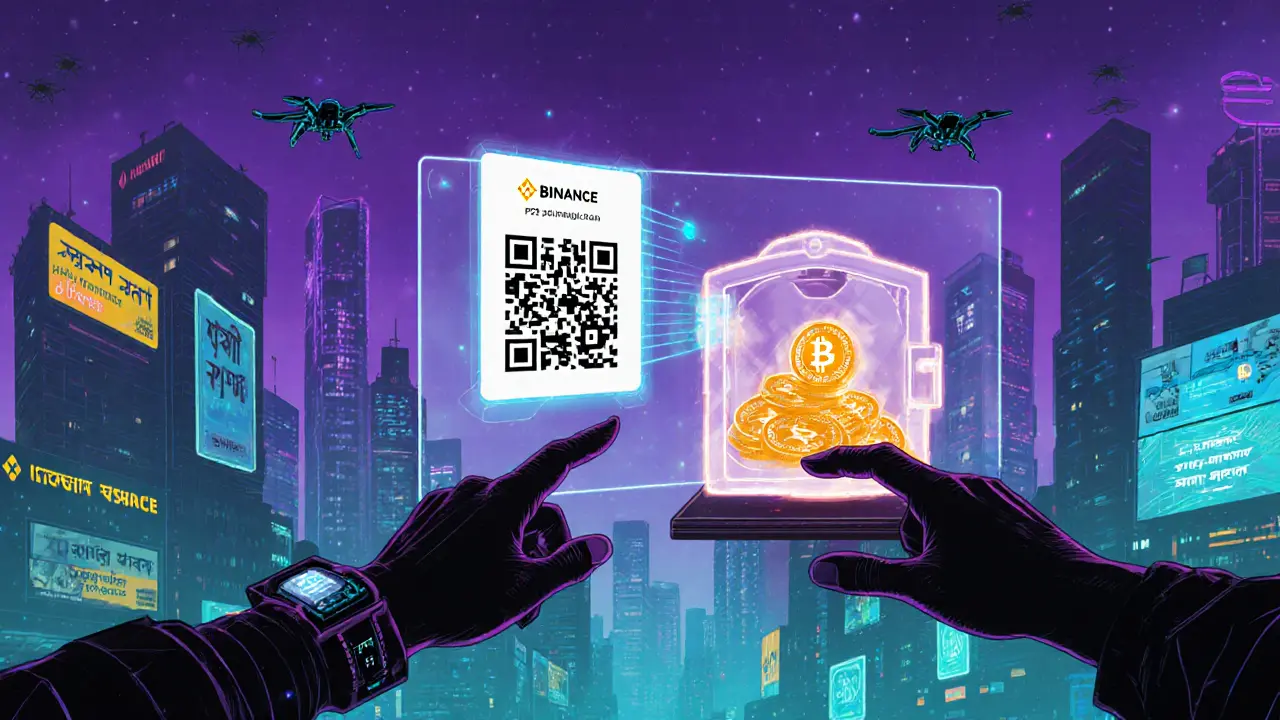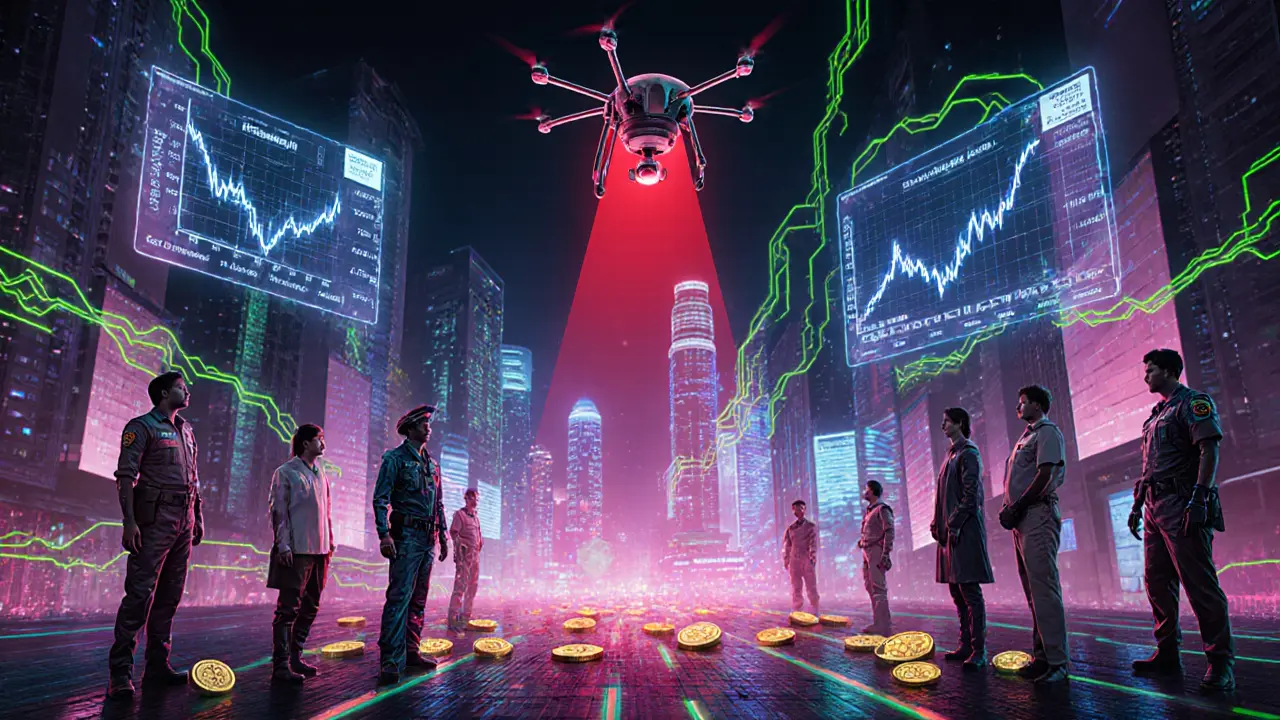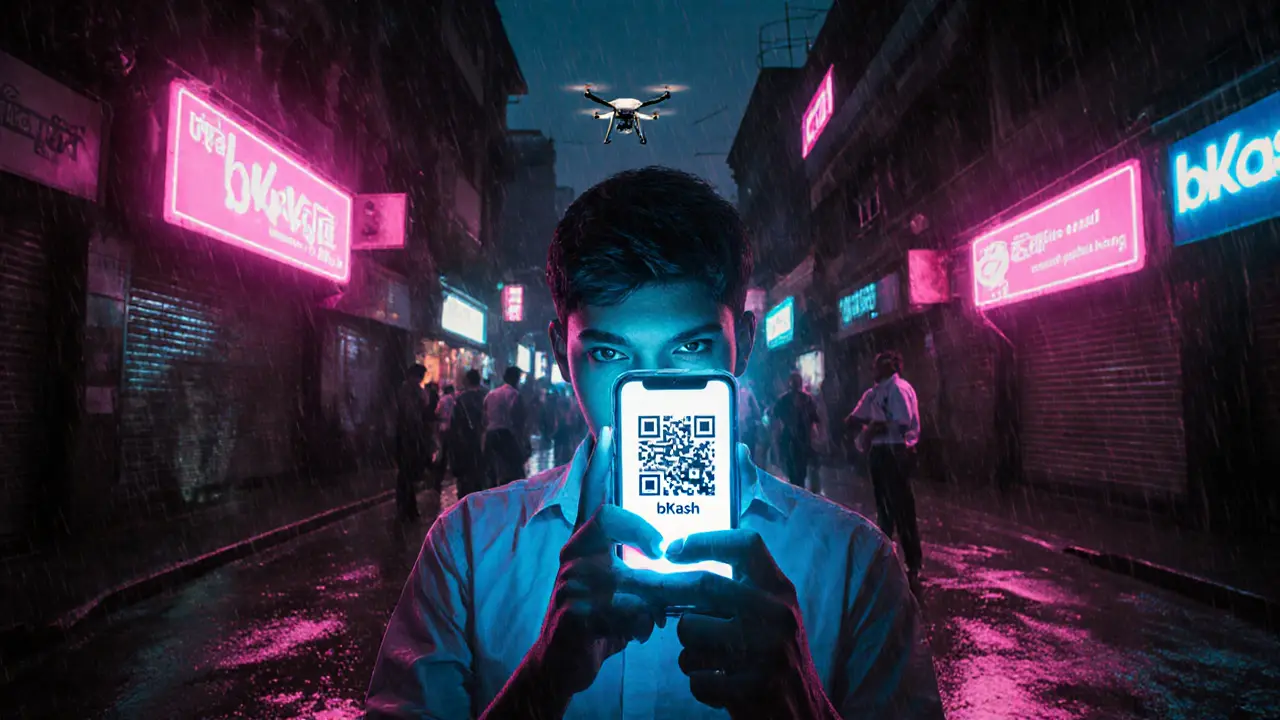P2P Crypto Trading Fee Calculator
Calculate the total fees and crypto you'll receive when trading through different P2P methods in Bangladesh. Based on market data from Q1 2025, this tool compares fee structures across exchange-based platforms, agent networks, and decentralized exchanges.
Exchange-Based P2P (Binance, Bybit)
Agent Networks
Decentralized Exchanges
Key Takeaways
- Bangladesh bans direct crypto transactions, but P2P crypto trading thrives via mobile‑money wallets.
- Three main methods exist: exchange‑based P2P (Binance, Bybit), informal agent networks, and decentralized exchanges (MetaMask + PancakeSwap).
- Escrow‑protected trades on Binance achieve a 99.98% success rate, while agent fraud accounts for 63% of negative user reports.
- Legal risk remains high - traders can face arrest under the Foreign Exchange Regulation Act.
- Market volume hit $417 million in Q1 2025 and could top $1.2 billion by 2026 if regulation stabilises.
When talking about P2P crypto trading peer-to-peer exchange of cryptocurrencies that bypasses traditional banking channels in Bangladesh, you step into a legal grey zone. The central bank has repeatedly warned that converting taka to any foreign currency without approval violates the Foreign Exchange Regulation Act of 1947. Yet, more than 3 million Bangladeshis-about 2 % of the population-use it daily to send money home, hedge inflation, or simply speculate.
Legal Landscape: Why P2P Is the Only Viable Path
Bangladesh Bank’s circular No. 13 (2017) makes it clear: any transaction that turns BDT into a foreign asset is illegal. The bank’s Deputy Governor Kazi Abdul Muktadir reinforced this stance in a February 2024 press conference, citing systemic‑risk concerns. Still, the Global Crypto Adoption Index 2024 placed Bangladesh at 35th worldwide, underlining a paradox-strict prohibition versus growing adoption.
Most traders stay out of the formal banking system and lean on mobile‑money platforms. With bKash holding 72.5 million active users and Nagad 45 million, these apps become the de‑facto bridges for crypto payments. The legal risk is real: in 2022, 17 traders were arrested under Section 411 of the Penal Code for “possessing stolen property,” i.e., cryptocurrency.
Why P2P Beats Traditional Remittance Channels
Official remittances reached $21.5 billion in 2022. Traditional banks and money‑transfer operators charge 3‑8 % in fees and take days to settle. By contrast, a typical P2P trade on Binance costs 0.5‑2 % and settles in under ten minutes. For a worker sending $5 000 to Dubai, the savings can exceed $200-an amount highlighted by Reddit user "CryptoRiderBD".
Three Primary P2P Methods in Bangladesh
Datawallet’s 2024 survey splits Bangladeshi traders into three buckets:
- Exchange‑based P2P platforms - Binance, Bybit, KuCoin. They offer escrow, multiple fiat payment options, and a UI in Bangla.
- Informal agent networks - local mobile‑money agents who act as crypto dealers. They provide cash‑in‑hand deals but charge higher spreads.
- Decentralized exchanges (DEX) - PancakeSwap on BSC accessed via MetaMask. They give near‑anonymity but need technical know‑how.

Exchange‑Based P2P: The Binance Playbook
Binance the world’s largest crypto exchange that offers a dedicated peer‑to‑peer marketplace for fiat‑to‑crypto trades dominates with a 73 % market share among Bangladeshi exchange users. Its escrow system holds the crypto until the seller confirms receipt of BDT via QR‑code payments on bKash or Nagad.
Typical flow:
- Create a Binance account (8,200 Bangladeshi sign‑ups per day reported in 2024).
- Complete KYC - mandatory for trades above $1 000.
- Choose “Buy BTC” (or USDT) and select “bKash” as payment method.
- Enter the amount (minimum ৳5,000, average first trade ৳7,500).
- Transfer BDT via the QR code; Binance’s escrow locks the crypto.
- Once the seller sees the payment, they release the crypto. Average completion time: 8.2 minutes.
The platform reports 1.2 million monthly P2P trades from Bangladesh with a 99.98 % success rate (SoluLab 2025). Spreads hover between 1.2‑3.5 % above market price, and escrow fees are bundled into the spread.
Informal Agent Networks: Cash‑Centric but Riskier
Mobile‑money agents act as on‑the‑ground dealers. Emily Shin’s Datawallet report listed 12,350 registered agents in Dhaka alone. These agents accept cash, scan a QR code, and hand over crypto in a split‑second.
Pros:
- Immediate cash‑in and cash‑out - no waiting for bank confirmations.
- Higher anonymity - no KYC if the trade stays under $1 000.
Cons:
- Spreads of 4‑8 % cut into savings.
- Fraud risk - 63 % of negative reviews involve agents reversing payments after receiving crypto.
- No formal dispute resolution; users rely on community blacklists (Telegram’s “Crypto BD Guide” has blocked 217 agents).
Decentralized Exchanges: The Tech‑Savvy Niche
For users who can handle a bit of tech, DEXes like PancakeSwap on the Binance Smart Chain (BSC) are attractive. Access is via MetaMask a browser‑based wallet that lets you interact with Ethereum‑compatible blockchains. After adding the BSC RPC (chain ID 56, BscScan.com as explorer), traders swap BUSD/USDT for other tokens.
Key stats:
- Only 8 % of Bangladeshi traders use DEXes (high technical barrier).
- Transaction cost averages 0.8 % vs 1.5 % on CEX platforms.
- Gas fees are around $0.15 per swap, paid in BNB.
- Error rates rise 32 % during BSC congestion peaks.

Security, Risks, and Dispute Management
Two‑factor authentication (2FA) is enabled by 98 % of users, yet only 37 % adopt multi‑signature wallets. The biggest threat remains fraud from agents and fake escrow pages. Binance’s built‑in dispute system rescued Reddit user "DhakaCryptoNewbie" after a 14‑hour battle, but the process can be slow during Eid holidays when mobile‑money systems overload (processing time jumps to 47 minutes).
Best‑practice checklist:
- Always verify the seller’s Binance rating (≥4.5 stars).
- Use “send money” in bKash, not “cash in”, to avoid payment rejections.
- Keep screenshots of QR codes and chat logs.
- Prefer escrow‑protected platforms over cash‑hand‑off agents.
- If a dispute arises, open a ticket on the exchange within 24 hours; for agents, report to the Crypto BD Guide Telegram channel.
Step‑by‑Step Guide for a First Trade
- Sign up on an international exchange that supports P2P (Binance is recommended for beginners).
- Complete KYC - upload a government ID and a selfie; process takes ~2.3 hours on average.
- Link your mobile‑money wallet - open bKash, go to “Scan QR”, and copy the QR code into the Binance P2P interface.
- Place a buy order - select USDT, set the amount (e.g., ৳7,500), and choose “bKash” as payment method.
- Transfer the BDT - follow the QR code, confirm the amount, and hit send. Your payment status will show “Pending”.
- Wait for the seller to release the USDT once they see the payment. This usually happens within 5‑10 minutes.
- Withdraw to your wallet - move the USDT to MetaMask or another secure wallet if you plan to trade on DEXes later.
The whole process averages 17.5 hours for total newbies, mainly because of KYC and first‑time payment hiccups.
Market Outlook and Emerging Trends
Chainalysis data shows Q1 2025 P2P volume at $417 million, up 38 % YoY. USDT dominates 72 % of trades, offering a stable bridge against BDT volatility. Binance holds 61 % of market share, followed by Bybit (19 %) and KuCoin (11 %).
Regulatory signals are mixed. Bangladesh Bank’s National Blockchain Strategy (2023‑2027) hints at a future CBDC, while a 12‑member Crypto Asset Task Force formed in Feb 2025 will draft rules by Dec 2025. Analysts project a 42 % CAGR, potentially reaching $1.2 billion by 2026 - provided enforcement does not tighten dramatically. Conversely, a 2025 risk assessment warned that a crackdown could shrink activity by up to 80 %.
For traders, the takeaway is to build a diversified approach: use Binance for volume, keep a vetted list of agents for quick cash deals, and experiment with DEXes for lower fees and anonymity.
Frequently Asked Questions
Is P2P crypto trading legal in Bangladesh?
Technically no. Bangladesh Bank classifies any conversion of BDT to foreign currency as illegal. However, the law does not specifically ban peer‑to‑peer platforms, so thousands trade at their own risk.
Which P2P platform is safest for beginners?
Binance’s escrow‑protected marketplace is the most widely used (68 % of Bangladeshi traders) and offers Bangla support, making it the safest entry point.
How do I avoid agent fraud?
Only trade with agents listed on verified community channels (e.g., the Crypto BD Guide Telegram). Verify the QR code matches the seller’s public address and never hand over cash without a receipt.
Can I use my mobile phone for P2P trades?
Yes. Android 8.0+ devices with at least 3 GB RAM run Binance and MetaMask smoothly. About 42 % of users still operate on older Android 7.0 phones, but they may experience slower performance.
What fees should I expect?
Exchange‑based P2P spreads range from 1.2‑3.5 % above market rate; agents charge 4‑8 %; DEX swaps cost about 0.8 % plus a $0.15 gas fee in BNB.
Staying informed, using escrow‑enabled platforms, and keeping a tight security routine can make P2P crypto trading a viable way to move money in Bangladesh-provided you accept the legal gray area.

Jenna Em
October 21, 2025 AT 08:19It feels like the whole P2P scene is a mirror reflecting our hidden anxieties, a digital bazaar where every QR code might be a surveillance trap. While the numbers look impressive, the underlying fear of a sudden crackdown looms like a storm. Mobile‑money wallets give us a thin veil of anonymity, but the state’s eye is always watching. If you think the escrow protects you, you’re buying a lullaby with a broken record. Stay vigilant, because in Bangladesh the line between freedom and fraud is razor thin.
Stephen Rees
October 23, 2025 AT 15:53Indeed, the allure of convenience masks a deeper calculus of risk, where each transaction becomes a gamble with the law’s invisible hand. The escrow may seem bulletproof, yet history shows that even the most polished platforms can be hijacked. One must weigh the fleeting gains against the perpetual dread of a future arrest. In this gray zone, patience and paranoia become essential tools.
Katheline Coleman
October 25, 2025 AT 23:26The comprehensive analysis of Bangladesh’s peer‑to‑peer crypto ecosystem reveals a multifaceted interplay of regulatory constraints, technological adoption, and market dynamics. First, the legal framework established by Bangladesh Bank categorically prohibits direct conversion of BDT to foreign assets, thereby compelling market participants to seek alternative channels. Second, the ubiquity of mobile‑money platforms such as bKash and Nagad creates an infrastructural substrate that facilitates rapid fiat movements, which are then leveraged for crypto purchases. Third, the statistical evidence indicating a $417 million P2P volume in Q1 2025 underscores a substantial latent demand that persists despite official admonitions. Fourth, exchange‑based platforms, most notably Binance, dominate the landscape with a 73 % market share, offering escrow mechanisms that mitigate counter‑party risk for the majority of users. Fifth, the reported 99.98 % success rate on Binance’s escrow system demonstrates operational robustness, yet it does not eliminate the possibility of systemic vulnerabilities. Sixth, informal agent networks, while providing instantaneous cash settlements, exhibit a 63 % incidence of fraud as documented in user surveys, highlighting the trade‑off between speed and security. Seventh, decentralized exchanges such as PancakeSwap cater to a niche segment of technically proficient traders, delivering lower fees at the expense of heightened complexity and exposure to network congestion. Eighth, the security posture of the community is reflected in the high adoption of two‑factor authentication, though multi‑signature wallets remain underutilized. Ninth, the risk calculus for individual traders must incorporate potential legal repercussions, including arrest under the Foreign Exchange Regulation Act, which remains a tangible threat. Tenth, the projected market trajectory, with a possible $1.2 billion valuation by 2026, is contingent upon regulatory stability and the avoidance of draconian enforcement measures. Eleventh, diversification across exchange platforms, vetted agents, and DEXes emerges as a prudent strategy to balance liquidity, cost, and anonymity. Twelfth, the operational minutiae of the Binance P2P workflow-account creation, KYC compliance, QR‑code payment, and escrow release-can be distilled into a repeatable process for newcomers. Thirteenth, the importance of meticulous documentation, such as screenshots of transaction confirmations, cannot be overstated in dispute resolution scenarios. Fourteenth, community‑driven blacklists and Telegram channels serve as informal governance mechanisms that help flag malicious actors. Fifteenth, the evolving policy discourse, including the National Blockchain Strategy and the Crypto Asset Task Force, signals a potential shift toward regulatory clarity. Sixteenth, traders must remain vigilant, adaptable, and well‑informed to navigate this volatile yet opportunity‑laden environment.
Amy Kember
October 28, 2025 AT 05:59Keep your screenshots and verify seller ratings before you send any BDT.
Evan Holmes
October 30, 2025 AT 13:33Escrow works.
Isabelle Filion
November 1, 2025 AT 21:06Ah, the lofty ambitions of the “crypto elite” who believe that a glossy interface can shield them from the very real possibility of a police raid; how delightfully naïve. One would assume that with such sophisticated security measures, the average trader has suddenly become a financial wizard immune to all peril. Yet the statistics tell a starkly different story, reminding us that even the most polished platforms are not insulated from human folly. Perhaps the next whitepaper will include a clause guaranteeing protection against governmental overreach-how very reassuring.
Patrick Day
November 4, 2025 AT 04:39What they don’t tell you is that every QR code scan is a little ear on the wall, feeding the big brother that runs the whole Bangladeshi crypto circus. The whole “escrow safe” story is just a smokescreen while the powers that be collect data on every transaction. Even the DEX hype is a distraction, a way to keep us dancing while the real money changes hands in shadows. Stay woke, because the next crackdown could hit while you’re busy swapping tokens on PancakeSwap.
Ryan Comers
November 6, 2025 AT 12:13Wow, look at you, Patrick, dropping truth bombs like it’s a fireworks show! 🎆💥 The way you paint the whole system as a surveillance nightmare is pure drama, but hey, at least it keeps us entertained. 🤡 Maybe the next episode will have a plot twist where the government hands out crypto freebies. 🙄
Prerna Sahrawat
November 8, 2025 AT 19:46Allow me to indulge in a thorough exposition of why the simplistically romanticized notion of “decentralized freedom” is, in reality, an elaborate facade constructed by opportunistic technocrats seeking to exploit naïve participants; indeed, the allure of anonymity on PancakeSwap is frequently overstated, as the underlying blockchain infrastructure still requires transaction fees, node participation, and an intimate understanding of smart‑contract intricacies that most users lack. Moreover, the pervasive belief that DEXes operate in a vacuum free from regulatory scrutiny is a willful ignorance that disregards the evolving legislative landscape in Bangladesh, where the specter of a crackdown looms ever larger. It is imperative to recognize that the so‑called “lower fees” are a double‑edged sword, providing cost savings at the expense of heightened vulnerability to network congestion, front‑running attacks, and malicious contract code. In addition, the psychological comfort derived from utilizing a decentralized platform often masks the very real risk of irreversible loss, as there is no recourse mechanism akin to Binance’s escrow dispute resolution. Consequently, while the romantic rhetoric of decentralization may appeal to the idealist within us, it is the pragmatist who must confront the harsh reality that without robust security practices, comprehensive education, and strategic diversification, the pursuit of “true freedom” may merely culminate in a lamentable saga of financial ruin.
Joy Garcia
November 11, 2025 AT 03:19Honestly, those who champion the DEX hype without acknowledging its pitfalls are just shouting into the void, painting a picture of utopia that never really existed.
mike ballard
November 13, 2025 AT 10:53From a fintech integration perspective, the interoperability of mobile‑money APIs with Binance’s P2P module exemplifies a micro‑service architecture that leverages RESTful endpoints for real‑time settlement. The latency metrics, currently averaging 7.8 seconds per QR‑code verification, align with industry benchmarks for low‑frequency transaction pipelines. However, the scalability constraints imposed by Bangladesh’s telecom bandwidth could precipitate bottlenecks during peak remittance windows, necessitating load‑balancing strategies such as horizontal pod autoscaling within the containerized deployment framework.
Tom Glynn
November 15, 2025 AT 18:26Great breakdown! 🌟 Your insight on API latency really hits the nail on the head. Keep it up, and let’s keep pushing the community forward! 🚀
Anna Kammerer
November 18, 2025 AT 01:59So, you’re telling me that the best way to avoid a legal nightmare is to follow a 7‑step guide that still leaves you vulnerable to a sudden arrest? Brilliant. I guess the next chapter will be “How to legally disappear after a crypto bust.”
BRIAN NDUNG'U
November 20, 2025 AT 09:33While the challenges outlined above may appear daunting, they also present a unique opportunity for disciplined traders to cultivate resilience and strategic foresight. By approaching each transaction with meticulous preparation-verifying seller credentials, documenting payment confirmations, and selecting platforms with proven escrow mechanisms-one can mitigate many of the inherent risks. Moreover, diversifying across reputable exchanges, trusted agents, and carefully selected DEXes enhances liquidity access while balancing exposure. In essence, thoughtful risk management coupled with continual learning transforms the volatile landscape into a fertile ground for sustainable growth.
Donnie Bolena
November 22, 2025 AT 17:06Indeed, the path forward is clear-embrace best practices, stay informed, and never underestimate the power of a well‑placed screenshot!; remember, every detail counts, and vigilance is your greatest ally; together, we can navigate this complex world with confidence and optimism!